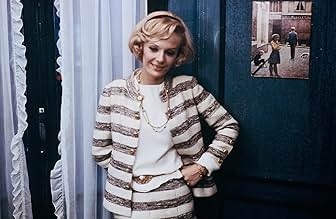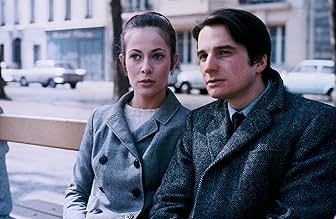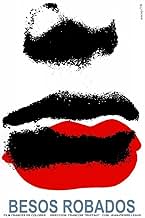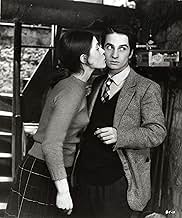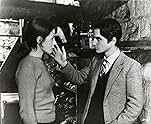Après avoir quitté l'armée, Antoine Doinel est le protagoniste d'une comédie loufoque dans laquelle il postule à différents emplois et essaie de donner un sens à ses relations avec les femme... Tout lireAprès avoir quitté l'armée, Antoine Doinel est le protagoniste d'une comédie loufoque dans laquelle il postule à différents emplois et essaie de donner un sens à ses relations avec les femmes.Après avoir quitté l'armée, Antoine Doinel est le protagoniste d'une comédie loufoque dans laquelle il postule à différents emplois et essaie de donner un sens à ses relations avec les femmes.
- Nommé pour 1 oscar
- 5 victoires et 7 nominations au total
- Georges Tabard
- (as Michel Lonsdale)
- Albani, le client de l'agence
- (as Simono)
Histoire
Le saviez-vous
- AnecdotesThe original French title of the film comes from a line in Charles Trenet's song "Que reste-t-il de nos amours?" which is also used as the film's signature tune.
- GaffesWhen Antoine kisses Christine in the basement, he pushes her back against the wall. The walls are dirty and leave black stains across the back of her sweater. When they leave and she reaches the top of the stairs, the stains are gone.
- Citations
Georges Tabard: Do you speak English, Antoine?
Antoine Doinel: I'm learning from records, but it's not easy.
Georges Tabard: Records are a joke. There's only one way to learn: in bed with an English girl. It's time you learned. I learned with an Australian girl while her husband was at work painting houses.
Fabienne Tabard: Like Hitler.
Georges Tabard: Don't ever say Hitler was a housepainter. That's slander. Hitler painted landscapes.
- Générique farfeluInstead of including "The lily in the valley" by Honoré de Balzac in the writing credits, François Truffaut shows the main character reading a book with a cover that says '"The lily in the valley" by Honoré de Balzac'.
- ConnexionsFeatured in Introduction to Truffaut Season (1972)
- Bandes originalesQue Reste-t-il de nos Amours ?
Music by Charles Trenet and Léo Chauliac
Lyrics by Charles Trenet
Performed by Charles Trenet
Antoine finds a job as a night porter in a hotel in Paris, thanks to Christine's father's recommendation, a comely Christine visits him one night, she greets him on the new job and seems casually happy but not so enthusiastic. Soon he is fired for being an unwitting helper of a private detective Henri (Harry-Max), who instead introduces him to the new exciting line of business managed by Monsieur Blady (Falcon). Antoine starts his new vocation with great passion although his stalking skill is a far cry from professional. Truffaut's perspicacious insight of urban savvy is brought to the fore in this segment, mainly surrounding two cases, a subtle love triangle about a (closeted) man looking for his magician lover and a more detailed inside-job, where Antoine is assigned to undercover in a shoe shop owned by Georges Tabard (Lonsdale, a great scene-stealer), who wants the agency to find out why he is so disliked by everyone around him, but the irony is that during Georges' loquacious introduction of his background, the reason behind that is pretty crystal-clear. During the course, Antoine is hopelessly having a crush with Georges' wife Fabienne (Seyrig, enigmatic and fabulously seductive), the apotheosis of a woman's sheer perfection. He is torn between his unquenchable fascination to Fabienne and the on-and-off relationship with Christine, which extracts the most vehement outburst in the mirror scenes where Antoine's unfitting characteristic is pungently reflected, with the iterations of self-persuasion and self-boost, to no avail. Eventually after tasting the temptation, which costs him the second job, he reconciles with Christine in the cutesy chapter where he works as a TV repairman, but the uncertainty of his own feelings becomes more pronounced in the coda, where a stalker makes a wanton confession to Christine in the presence of Antoine, both dismiss at him on the spot, but think twice, it is the capriciousness of love and emotions that will certainly puzzle Antoine, and trigger every viewer, to discover what will happen to him and Christine later, aka. in BED & BOARD (1970), approximately after a two-years spell.
STOLEN KISSES is charming in its carefree tempo and disarming in its frankness about whimsical triviality, it is not a major or challenging piece of work from Truffaut, but still scintillates with the profundity of a intelligent life-observer, an obliging humorist and an inspiring filmmaker.
- lasttimeisaw
- 9 janv. 2016
- Lien permanent
Meilleurs choix
- How long is Stolen Kisses?Propulsé par Alexa
Détails
- Date de sortie
- Pays d’origine
- Site officiel
- Langues
- Aussi connu sous le nom de
- Stolen Kisses
- Lieux de tournage
- 15 Rue de Steinkerque, Paris 18, Paris, France(exteriors: Antoine's apartment facing Sacré Coeur)
- sociétés de production
- Consultez plus de crédits d'entreprise sur IMDbPro
Box-office
- Budget
- 350 000 $ US (estimation)
- Brut – États-Unis et Canada
- 509 $ US
- Fin de semaine d'ouverture – États-Unis et Canada
- 11 206 $ US
- 25 avr. 1999
- Brut – à l'échelle mondiale
- 509 $ US
- Durée1 heure 31 minutes
- Mixage
- Rapport de forme
- 1.66 : 1
Contribuer à cette page


![Regarder Bande-annonce [OV]](https://m.media-amazon.com/images/M/MV5BMDA4YTUxMjAtMDMwNi00MWY1LTllZTgtZTQzZjRlMjE1NWEwXkEyXkFqcGdeQXRyYW5zY29kZS13b3JrZmxvdw@@._V1_QL75_UX500_CR0)
